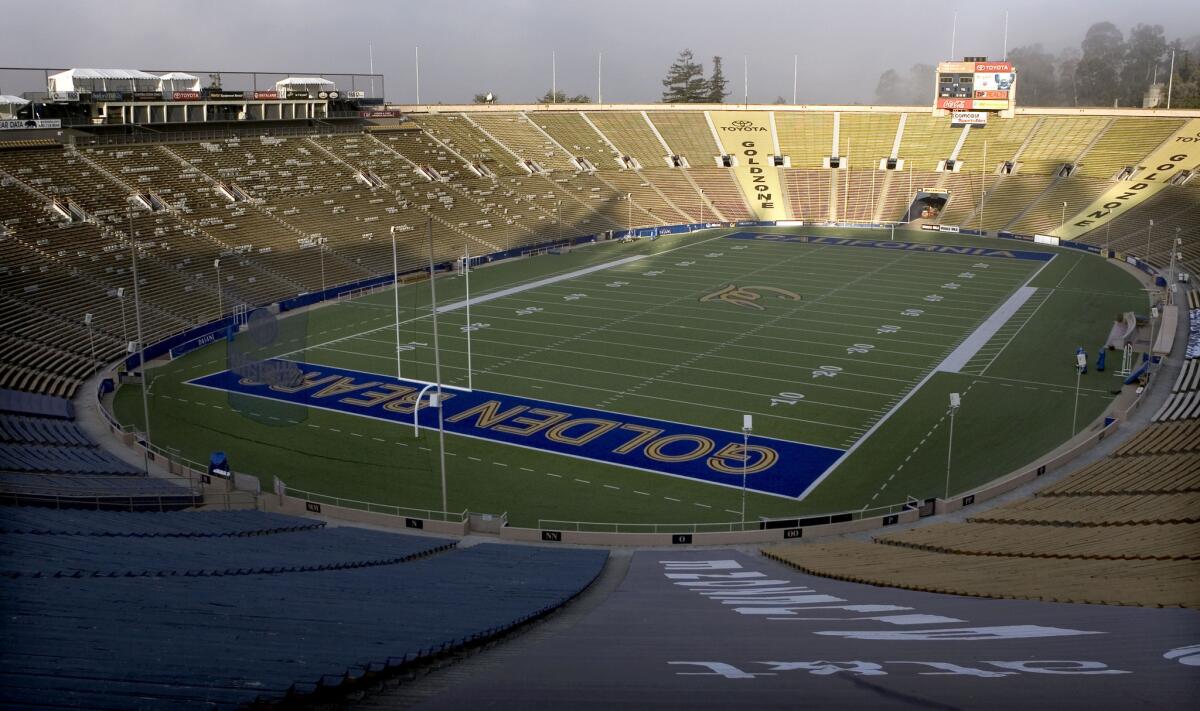Workers allege 80-hour weeks with no overtime at UC Berkeley sporting events

Employees of a contractor who provided janitorial services for UC Berkeley sporting events said they were routinely denied overtime pay for workweeks that were 80 or 90 hours long.
- Share via
Federal authorities are investigating allegations that a UC Berkeley custodial contractor underpaid workers who cleaned up after Golden Bears football games and other sporting events, denying them overtime pay for weeks that stretched to 80 or 90 hours.
The probe of Performance First Building Services, which has provided janitorial services at UC Berkeley for nearly seven years, was launched by the U.S. Department of Labor, according to the agency and former and current employees.
The investigation comes as the University of California system, the state’s third-largest employer, faces increasing scrutiny from lawmakers into the working conditions of thousands of contracted employees who provide essential services such as cleaning, security and landscaping. The state Legislature passed a bill last month that would require UC contractors to pay wages and benefits on par with direct employees of UC who perform comparable work. The bill has not yet been signed by Gov. Jerry Brown.
Juliana Robles worked at Performance First from 2008 until she was fired in July, cleaning the California Memorial Stadium at UC Berkeley. During football season, she said, she worked seven days a week, often putting in 16-hour days from Thursday through Saturday to prepare for and clean up after Golden Bears games.
She said she never received more than $10 an hour, though California law requires that employees be paid at least 1.5 times their regular pay after exceeding eight hours in a day or 40 hours in a week. Robles said Performance First evaded the rules by issuing her checks under two names — one for her and one for her boyfriend, who hadn’t worked at the company for years.
Robles provided the two pay stubs to The Times and to investigators at the Labor Department, who contacted her last month. A Labor Department spokesman, Jose Carnevali, confirmed the open investigation but declined to comment further.
“The majority of people were being paid under two names,” Robles said. “I thought about reporting it. But at the same time I didn’t want to, because I was scared.”
Officials at Performance First Building Services did not respond to calls and emails seeking comment.
UC Berkeley spokeswoman Janet Gilmore said the university was aware of the Department of Labor’s investigation into Performance First, but had been told it was not a matter involving the school. She said the university first learned of workers’ complaints from The Times. She said the university is reviewing the matter before taking any action and will “respond appropriately based on what we find.”
Labor advocates have long criticized UC’s reliance on contracted employees, some of whom make close to minimum wage and work for years alongside full-time employees who are paid twice as much for the same jobs.
“It’s against their mission; it’s irresponsible,” said Assemblywoman Lorena Gonzalez, a former labor leader in the San Diego area who supported the measure. “They’re a very large employer with a lot of resources, and I think they should care more about their workers.”
UC has opposed the legislation, citing estimated annual costs of $36 million to provide equal benefits, and between $12 million and $24 million for equal wages. UC officials said they already have a plan to boost minimum pay in the system to $15 an hour by 2017 for both direct and contracted employees.
UC officials also said they have set up a hotline for workers to report alleged mistreatment by contractors.
The UC system does not have an estimate of how many contracted employees would be affected by the wage initiative because of the vast number of contracts for a wide range of services across the state.
Critics of UC’s contracting system say the allegations from Performance First workers show serious problems with UC’s ability to police its contractors.
Performance First has had the contract to clean Berkeley’s athletic facilities since late 2008. That’s when Robles started working at California Memorial Stadium, cleaning offices and ballrooms for special events.
She started noticing issues with overtime when she was asked to clean for two additional hours unpaid at the end of each shift. She said she brought it up with her supervisors, who told her they wouldn’t pay extra because “it’s your area, and it’s your responsibility,” regardless of the hours worked.
During football season and at other major sporting events, she would regularly work shifts from 6 a.m. to 9 p.m., hauling trash and recycling bins before and after games. Workers often didn’t get lunch breaks, she said, because there was too much work to do.
When the hours started piling up from overtime, she said, her bosses started giving her separate checks to avoid going over 40 hours a week. On weeks when she worked 80 hours, that meant she was making 35% less than she should have under California law.
She rarely saw her children, who pleaded with her to work fewer shifts.
“I would tell them, ‘I’m sorry, I do this for you,’” she recalled. “I need to make money.”
After speaking with unionized full-time Berkeley janitors, she said she started to organize with other Performance First workers and attend meetings about their working conditions. Her supervisors found out, she said, and fired her in July.
She’s been unable to find steady work since, and her family was evicted from its East Oakland apartment in August.
Last month she said she got a call from a Labor Department investigator, who asked for contact information for fellow employees.
Another Performance First employee, Consuelo Barrera, said she also got a call from the Labor Department. She said she told the investigator that she is often asked to work extra hours without pay, and is often tasked with cleaning up areas that typically were handled by two or three employees in the past.
While employees interviewed by The Times said they have never made more than $10 an hour after years of working at Performance First, contract documents show the university pays Performance First $20.97 an hour for a janitor.
Gilmore, the Berkeley spokeswoman, said that unless the contract specifies what a contractor will pay its workers, “this is information that is kept between the contractor and the workers it hires.” She said the Performance First contract expired at the end of June, but is being paid through individual purchase orders.
Contract workers will earn at least $13 an hour beginning this month as part of the university’s minimum wage plan, she added.
Gonzalez, the assemblywoman who supports the bill, said the disparity between what UC pays the contractor and what workers are actually paid shows the inherent problems of contracting out service work to those promising the lowest price.
“The administrative costs are over 100% of the actual labor costs,” she said. “Lowest-bid contracting is dangerous. Especially when you’re talking about service contracts.”
ALSO
Damaged Torrance Exxon refinery sold; gas prices unlikely to drop soon
Tesla delivered only 6 Model X SUVs -- and Elon Musk took one for himself
Wishbone teen polling app, asking things like ‘Burgers or tacos?’, has 3.1 million users
More to Read
Inside the business of entertainment
The Wide Shot brings you news, analysis and insights on everything from streaming wars to production — and what it all means for the future.
You may occasionally receive promotional content from the Los Angeles Times.











